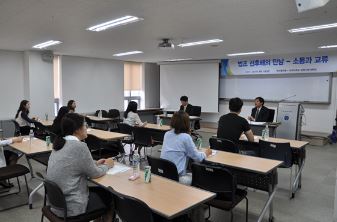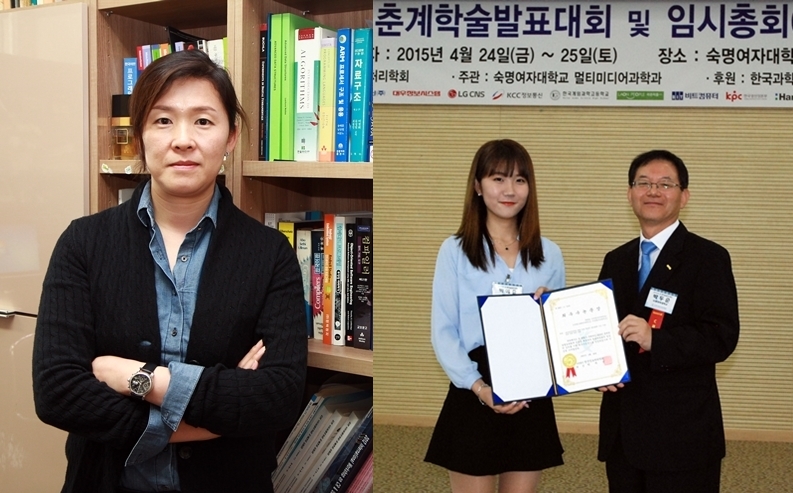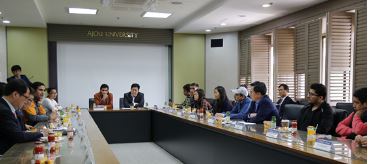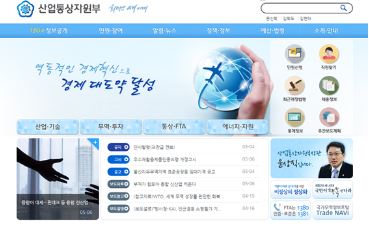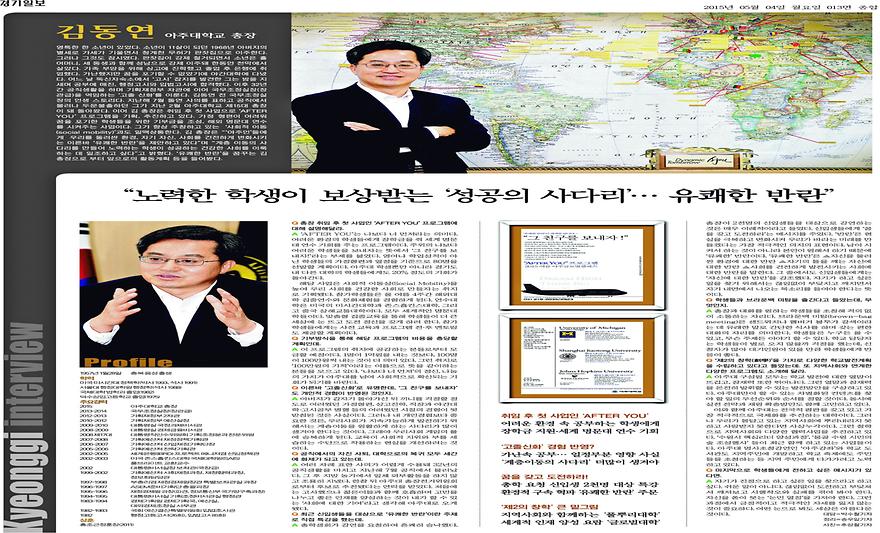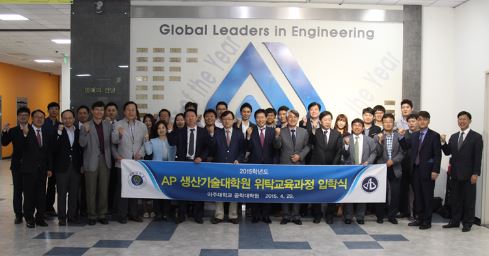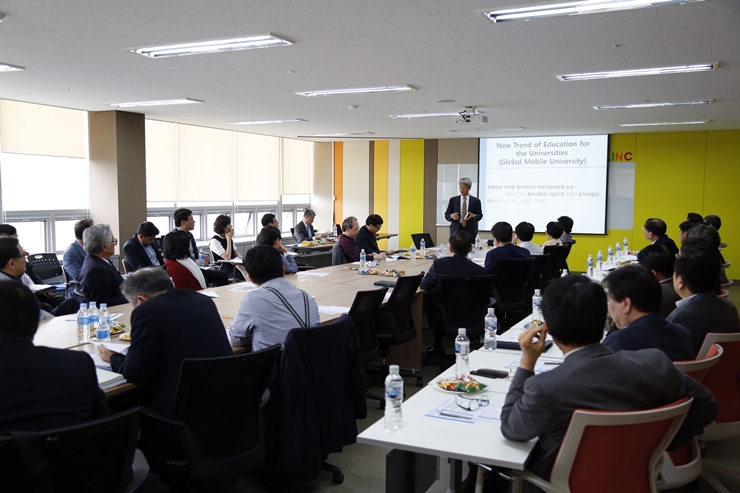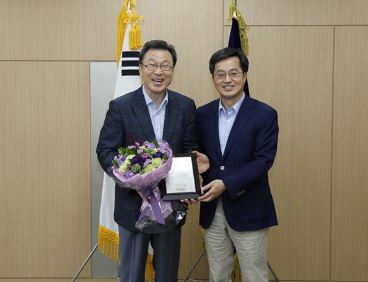-
Ajou's President says "We need warm-hearted elite" in his lecture at the Korea International Trade Association2015-09-21On September 18th, Ajou University's President Dong Yeon Kim gave a lecture at the 98th Breakfast Meeting for CEOs hosted by the Korea International Trade Association (KITA). It was held in Samseong-dong, Gangnam-gu, with about 300 business leaders in attendance.In his lecture entitled "Pleasant Innovation," President Kim stressed that there should be true 'compassionate' leaders in our society.He said, "We need 'true elite' who are warm-hearted in order to address the marginalization and social conflicts in Korea," adding, "While everyone tries to enter leading universities and corporations, the ratio of those who can actually do so is only five percent. Korea cannot be a healthy society if the remaining 95 percent of people are considered losers."He went on to say that the social cartel in Korea – once you join the top five percent, you can live happily for the rest of your life without much effort – should be broken, and that true elites who practice 'noblesse oblige' are necessary to accomplish this.President Kim also introduced his efforts and experiences to overcome financial difficulties, and mentioned the After You Program that the University has launched.Since 2005, KITA has organized the monthly breakfast meeting for CEOs where lectures are delivered by invited experts in the fields of economy, society, culture, and arts. < Above photo was provided by the Korea International Trade Association >
-
50
- 작성자OIA
- 작성일2015-09-30
- 28834
- 동영상동영상
-
Ajou's first ‘After You Program' concludes with a mentoring event2015-09-18An event to mark the conclusion of the first ‘After You Program - 2015 Summer Ajou Global Campus,' which was conducted this summer, was held on the afternoon of September 18th in the lobby of Ajou University's Yulgok Hall.The event was attended by After You Program participants, guiding staff members, professors including those with administrative positions, other staff members from the University, and members of ‘Cheong Ya,’ who have served as mentors to the participants. Cheong Ya is a society of people who pioneered their future on their own by attending night high schools or colleges because of financial difficulties.Su Jin Moon (Department of Political Science and Diplomacy, entering class of 2014), a participant in the Program at the University of Michigan, served as the MC for the day's event, which kicked off with presentations on the Program by guiding staff members for the respective partner universities. The presenters were Assistant Manager Ji Seon Kim (Academic Office of the College of Humanities), who went to the University of Michigan, Assistant Manager Sung Sook Park (Academic Office of the College of Engineering), who accompanied those going to Johns Hopkins University, and Do Yeon Kim (Office of International Affairs), who assisted the participants assigned to Shanghai Jiao Tong University.Student participants also gave presentations on their activities at the partner universities and the lessons they learned: Ban Seok Lee (Department of Business Administration, entering class of 2010), Jong Hwan Chang (Department of Business Administration, entering class of 2011), Ah Ryun Suh (Department of Mechanical Engineering, entering class of 2011), and Bo Seok Song (Department of Advanced Material Science and Engineering of Sungkyunkwan University, entering class of 2010) represented those who went to the University of Michigan. Dong Ho Kang (Department of Culture and Content, entering class of 2011) and Sol Kim (Department of Business Administration, entering class of 2011) presented for those who participated at Shanghai Jiao Tong University, and Sang Myeong Lee (Department of Culture and Content, entering class of 2013), Min Jeong Kim (Department of Industrial Engineering, entering class of 2014), and Chang Ryeol Oh (Department of Culture and Content, entering class of 2012) spoke for the Johns Hopkins University participants.The participants then read words of appreciation for Program donors and mentors, followed by conversations with mentors. After the main program, students and mentors had a beer party on the lawn in front of Seongho Hall.President Dong Yeon Kim, who was in attendance at the event, said, "One of the concerns I have had while working as a public official and scholar majoring in policy-making theory is that the goals of a policy are not easy to achieve," adding, "Listening to your presentations today, I felt that the objectives and missions of the After You Program were successfully realized."President Kim went on to say, "I hope that the values of challenge-taking and consideration for others will spread beyond Ajou's boundaries through the Program," adding, "I expect that you will become brave and energetic Ajou people."The “After You Program – 2015 Summer Ajou Global Campus” was established to provide opportunities to students who find it hard to build overseas experience due to various difficulties. Program participants have been to the University of Michigan and Johns Hopkins University in the U.S. and Shanghai Jiao Tong University in China for 4-week intensive training during this summer vacation. All the expenses for the participants at the University of Michigan and Shanghai Jiao Tong University programs, and 60 percent of the expenses for those who went to Johns Hopkins University were covered by scholarships. The programs are funded by donations from people outside Ajou University who agree with the need for such an initiative.
-
48
- 작성자OIA
- 작성일2015-09-30
- 28816
- 동영상동영상
-
Ajou's retiring professors - Jin Cho, Seung Kyu Park, and Seung Ho Lee - receive plaques of appreciation2015-09-16A ceremony for presenting plaques of appreciation to Ajou's professors who will retire from the University after the spring semester of this year was held on September 16th in the President's Office in Yulgok Hall.Those who will retire are Professor Jin Cho (Department of Mechanical Engineering), Professor Seung Kyu Park (Department of Software Convergence Technology), and Professor Seung Ho Lee (Department of Mathematics). During the ceremony, Ajou's President Dong Yeon Kim presented plaques of appreciation and pure gold keys to them and expressed his gratitude for their hard work.They also received awards from the government. Professor Cho and Professor Lee received the Order of Service Merit (Aquamarine Stripes) and the Order of Service Merit (Red Stripes), respectively. The former is given to those who have served for 33-35 years at universities, and the latter is presented to those who have worked for 38-39 years. No award was given to Professor Park on that day, because he had already received the Order of Civil Merit (Mongnyeon Medal).Professor Cho obtained his PhD from Ecole Centrale de Nantes in France and began to work at Ajou in 1982. He served as Head of the Department of Mechanical Engineering, Deputy Director of the Center for Industrial Education, and Director of the Research Center for Automotive Parts Technology, etc.Professor Park obtained his PhD from Institut National Polytechnique de Greno in France and worked as a researcher at IBM's Thomas J. Watson Research Center in the U.S. and the Electronics and Telecommunications Research Institute in Korea. He then began to teach at Ajou in 1992. Professor Park donated 15 million won in scholarships for the College of Information Technology in celebration of his retirement.Professor Lee received his PhD from Seoul National University and has been with Ajou since 1980. He served as Dean of the College of Natural Sciences, Vice President for Academic Affairs, Director of the Science Education Center for Gifted Students, and Dean of the Dasan University College. Professor Lee donated 10 million won to the Development Fund of the Department of Mathematics in celebration of his retirement.Professors with administrative positions including Executive Vice President for Industry-Academia Cooperation Kyung Hee Choi, Vice President for Academic Affairs Suk Chul Rim, Vice President for Student Affairs Jai Hyoung Cho, and Vice President for Admissions Jung Ju Choi, and other professors from the departments of the retiring professors attended the ceremony on the day and gave their words of appreciation and celebration.* From far left in above picture are Professor Jin Cho, Professor Seung Ho Lee, President Dong Yeon Kim, and Professor Seung Kyu Park
-
46
- 작성자OIA
- 작성일2015-09-23
- 28827
- 동영상동영상
-
A team under Ajou's Professor In Sun Cho develops nano material technology that raises efficiency of hydrogen production2015-09-15A team led by Ajou University's Professor In Sun Cho (Department of Materials Science and Engineering, pictured above) developed nano material manufacturing technology that will significantly raise the efficiency of hydrogen production through solar cells.The research was conducted with the support for essential research projects carried out by the National Research Foundation of Korea, and its findings were published in the August 18th issue of The Nano Letters, a renowned academic journal in the field of nano-technology, under the title of "Highly Efficient Solar Water Splitting from Transferred TiO2 Nanotube Arrays."Professor Cho said that he joined hands with Professor Jong Hyeok Park (Yonsei University) and Professor Tai Ho Park (Pohang University of Science and Technology) to develop nano material manufacturing technology that will significantly raise sunlight absorption and electricity conductivity by using TiO2, a photocatalyst.The research will increase the efficiency of hydrogen production through solar-cell-based water splitting to the highest theoretical level. The technology allows for hydrogen production by splitting water with semi-conductor materials and solar cells. While hydrogen energy is drawing attention as a clean energy of the future, the technological production efficiency should be at least 10 percent for it to be commercialized.However, there has been difficulty in raising hydrogen production efficiency via solar cells, because titanium oxide (TiO2), tungsten oxide (WO), or bismuth vanadium oxide (BiVO), that are used as an oxidation photoelectrode have low efficiency.In order to address this issue, the research team created titanium oxide nanotube material by making a nanotube structure from titanium oxide material and applying dual reduction procedures that combine chemical and flame reductions.Professor Cho said, "The highly efficient nano material technology based on chemical and flame reductions can be applied to tungsten oxide, iron oxide, and bismuth vanadium oxide, etc. as well as those based on titanium oxide," adding, "These materials are very high in theoretical efficiency levels, and I believe that the 10 percent efficiency limit can be surpassed through additional research and development.The research by Professor Cho's team can expand applications of titanium oxide materials that are being used in many products including cosmetics and paint. In addition, the findings are expected to considerably increase the chances of commercializing solar-cell-based hydrogen reduction technology. The commercialization is predicted to come within the next ten years. < Diagram of titanium oxide transfer coating on nanotube, and the technological process of chemical and flame reductions >
-
44
- 작성자OIA
- 작성일2015-09-22
- 28402
- 동영상동영상
-
Ajou's Law School students meet lawyers from law firms2015-09-14On September 11th, a program entitled 'A Meeting Between Seniors and Juniors in the Legal Profession – Communication and Exchanges' was held in the College Academic Building at Ajou University. Ten lawyers from major Korean law firms took part in the event and had conversations with about 50 students from the University's Law School.The program, which was organized by the Korean Legal Center (KLC), lasted from 2 p.m. to 5 p.m. on that day in five classrooms. The KLC prepared the event to help lawyers consult prospective lawyers about their concerns and establish role models as senior lawyers.During the event, Dong Geon Kim from Barun Law and other lawyers discussed the ethics of legal practitioners and their philosophies of life, etc. In addition, they provided customized advice to the University students on their future careers.Lawyers who participated in the program are as follows:▲ Dong Geon Kim (Barun Law) ▲Soon Moo Soh (Yulchon) ▲In Jae Lee (Bae, Kim & Lee) ▲Hyo Geun Jin (Jin Hyo Geun Law Firm) ▲In Dong Park (Kim & Chang) ▲Jeong Jin Choi (Daeryook & Aju) ▲Tae Hak Chung (Yulchon) ▲Seung Su Kang (Kim & Chang) ▲Sang Jin Kang (Kim & Chang) ▲Hyeon Hee Choi (Hyeonjae) The KCL's program at Ajou is the third session following similar events that were held in the Law School at Seoul National University in July and the Law School at Yeungnam University in August under the same title. Ajou University and Suwon City hold the '2015 Suwon Drone Festival'2015-09-14Ajou University and Suwon City held the '2015 Suwon Drone Festival' on September 12th and 13th at the University campus. The festival turned out to be popular, attracting about 20,000 citizens.The Festival featured lectures, demonstrations, and exhibitions regarding drones, and offered opportunities for participants to try drones. In addition, there were performances to celebrate the event, including formation flying of drones, b-boy performances, and a performance by Ajou's cheerleading team Cento.Drone demonstrations were opportunities for participants to see how drones are actually used in life-saving at sea, emergency rescue activities, airplane crop dusting, etc. At the booths established on the University's auxiliary field by drone-related industry, academia, research institutions, and public agencies from Korea and abroad displayed various types of drones and their parts. Other programs included contests of drone racing, aerial photos taken by drones, and model aircrafts made by teenagers. Ajou's professors led by the LINC Project Group also took part in the event and set up booths where people were able to experience drones and see drone-related studies firsthand. Professor Yong Jin Kwon (Department of Industrial Engineering) demonstrated an integrated simulator for manned and unmanned aircrafts and formation flying of drones, and Professor Jeong Han Ko (Department of Industrial Engineering) showed how drones are made with 3D printers. Other interesting activities were experiencing tactical data link simulators for national defense prepared by Professor Ho Gi Baek (Department of Military Digital Convergence) and a meeting between unmanned automobiles and drones prepared by Professor Bong Sob Song (Department of Mechanical Engineering).During the first day of the Festival, the Policy Research Society for the Drone Industry led by Professor Kwon hosted an academic seminar on the development of the drone industry under the theme 'Innovations to Be Brought by Drones.' Six drone experts from the industry, academia, and research institutes were invited to the seminar.Suwon City Mayor Tae Young Yeom said, "We would like to develop Suwon into a leading city in the drone industry based on its excellent infrastructure," adding "Suwon is one of the perfect cities for our vision because we have Samsung Electronics and about 600 related companies here, and we can access an outstanding pool of talents at Ajou and other universities."Ajou University's President Dong Yeon Kim said, "While the drone industry is in its early stage, its market size is already valued at about 2 billion dollars and related startups and industry are sharply growing," adding, "Ajou would like to join forces with Suwon City for the development of the drone industry."Ajou's Visiting Professor Jin Pyo Kim (Graduate School of Public Affairs), a former member of the National Assembly, and Sang Min Kim, a current member of the National Assembly and former President of Ajou's Student Council, gave congratulatory messages at the festival.Drone – unmanned aircraft – was first developed for military purposes in early 20th century, and its uses are expanding into police investigations, disaster relief, agriculture, and logistics, etc.
-
42
- 작성자OIA
- 작성일2015-09-22
- 28476
- 동영상동영상
-
Ajou University Professor Jung Won Lee (Department of Electrical and Computer Engineering, pictured on the left above), Research Professor Mi Youn Lee, and Ye Seul Park (pictured on the right above), a student in the master’s course in the Department of Electrical and Computer Engineering, won the Best Paper Award from the Korea Information Processing Society on April 24th during its Spring Academic Conference held at Sookmyung University. Their paper topped the ranking of a total of 345 papers presented to the Society, with 24 other papers receiving Excellence Awards. The Best Award paper combined information technology with medical issues, and it is entitled “Extracting Illness-related Features from Medical Images Involving Acute Myocardial Infarction Based on the Structure of Coronary Arteries.” The findings were the results of applying a combined model of medical images and different data, which focuses on the features of diseases, to acute myocardial infarction. Ye Seul Park, the main author of the paper, explained: “For acute myocardial infarction, it is vital to examine the conditions of patients’ coronary arteries and take proper actions within the golden time. However, it is not easy to identify significant information from medical images that are being used for such purposes. In this research, we tried to identify only the information that is meaningful in medical terms from that which is included in the images and combined it in a way that helps practitioners understand the information in an intuitive and efficient manner.”
-
40
- 작성자OIA
- 작성일2015-05-15
- 27763
- 동영상동영상
-
A meeting was held at 2 p.m. on May 6th in Yulgok Hall to encourage Ajou University students from Nepal, who were shocked by the earthquake that hit Kathmandu, Nepal, on April 25th. Participants at the meeting included President Dong Yeon Kim, Dean Joong Soon Jang of the Graduate School, Dean Jay Ick Lim of the Graduate School of International Studies, Vice President for Student Affairs Jai Hyoung Cho, and Vice President for External Relations Byung Chun So, as well as 21 Nepalese students attending the University. Currently, there are 13 Nepalese students at the University’s Graduate School and 22 students at the Graduate School of International Studies. Among them, Acharya Anil’s uncle who lived near Kathmandu was killed, and some other students’ houses were flooded or partly damaged by the earthquake. President Dong Yeon Kim told the Nepalese students, “Ajou people were all shocked by the earthquake, and we know how painful it is because we lost many lives in the sunken ferry Sewol,” adding words of encouragement, “I ask you to have the courage to address the challenge and focus on completing your studies here, which will also benefit your home country.” He went on to say, “We are raising funds from the University’s professors and staff members until May 8th to help Nepal, and I will find the most efficient way to deliver the aid once the collection is completed. In addition, I will contact Suwon City to find ways for sending a medical team.” Sujata Bantawa gave words of appreciation by saying “Nepalese students were in deep sorrow because of the earthquake-related damage, and we have been impressed by the encouragement of President Kim and the professors and the discussion of specific ways to help Nepal.”
-
38
- 작성자OIA
- 작성일2015-05-12
- 27641
- 동영상동영상
-
Ajou University has been selected as a partner for the 2015 Energy Experts Fostering Project (for the University’s Support for Advanced R&D Experts Program). The Project is run by the Korean government, and the University will receive investments of 400 million won a year from the government for up to five years (investments for the first two years are confirmed, and they can be extended for the next three years subject to certain conditions). The Project is being carried out by the Ministry of Trade, Industry and Energy with the aim of fostering energy and R&D experts, and it consists of three programs (Capability Development of Future Experts in Basic Fields; Support for Advanced R&D Experts; and Promotion of International Talent Exchanges). The Ministry is scheduled to spend 8.3 billion won on the Project this year alone. The University designated ‘Next Generation Clean Energy Based on Gasification and Chemical Conversion Technology’ as its Program task, and it plans to operate a track within the Department of Energy System Research under the Graduate School. Graduate students attending the Department of Energy System Research and the Department of Mechanical Engineering are likely to take part in the track. For the Program, the University’s Industry-Academia Cooperation Group led the formation of its own project group including 15 public corporations and small- and mid-sized companies and two research institutes. Also taking part in the project group are 17 professors who majored in chemical engineering, energy engineering, chemistry, mechanical engineering, economics, physics, and educational engineering. The group plans to produce about 100 people with master’s and doctoral degrees in the fields of next generation clean energy technologies. [Participating companies]Korea District Heating, Korea Western Power, Korea Midland Power, Korea East-West Power, Korea Southern Power, Ajou NBC, Combustech, Nanopac, Advanced Technology & Energy Saving, Samho Enviro-Tech, CES, Doori Filter System, SFC, eZRobotics, and Telin[Research institutes] Institute for Advanced Engineering, and Korea Institute of Energy Research
-
36
- 작성자OIA
- 작성일2015-05-12
- 27453
- 동영상동영상
-
-
34
- 작성자OIA
- 작성일2015-05-11
- 27644
- 동영상동영상
-
Ajou’s Graduate School of Engineering and Amore Pacific (AP) opened the ‘Commissioned Production Technology Education Course for AP,’ and the entrance ceremony for its 22 students was held on April 29th in the University’s Paldal Hall. Students in the course are AP employees in the company’s Supply Chain Management department and are leading businesses in China. The specialized education course is a 36-hour program over 12 weeks. The students will take two subjects (Smart Convergence Industry and Big Data Analysis, and Metallic Mold Packaging Material) during the spring semester and three subjects (Line Optimization, Rheology, and Hydromechanics) during the fall semester. Dean Kun Mo Lee of the Graduate School of Engineering said, “I hope that this course will contribute to AP’s development into the world’s leading cosmetics maker,” adding, “I also look forward to a close partnership in industry-academia cooperation between Ajou University and AP.” The entrance ceremony was attended by Executive Director Byeong Do Kang, Director Joo Seong Baek, and Director Suk Choi from AP and Dean Joong Soon Jang of the Graduate School, Dean Kun Mo Lee of the Graduate School of Engineering, and Dean Yun Ho Choi of the College of Engineering from the University.
-
32
- 작성자OIA
- 작성일2015-05-11
- 27172
- 동영상동영상
-
< President Jae Won Kwak of the Gyeonggi Institute of Science & Technology Promotion (GISTP) gives a lecture at Ajou > The first session of the Special Lecture by Invited Experts for Ajou’s professors and staff members was held on May 4th in Room 1101 of the University’s College Academic Building. The Special Lecture series consists of a total of three sessions on consecutive Mondays. Following the lecture by GISTP President Kwak on May 4th, Professor Hak Chun Lee from Dong-A University’s Graduate School of International Studies will give a lecture on May 11th, and Doctor Chun Shik Woo from the Korea Development Institute on May 18th. The first lecture by GISTP President Kwak was given under the theme of the “Information Technology and Bio Technology Belt in Pangyo and Gwangyo,” and it was attended by a total of 50 Ajou people including President Dong Yeon Kim, professors with major positions, and other staff members. The lecture lasted for about 40 minutes, after which the lecturer and the participants talked informally over a sandwich lunch. The post-lecture discussion lasted about one hour and twenty minutes, and the participants, among other things, expressed their concerns about how the University could take advantage of its environment and grasp the opportunity for growth. GISTP President Kwak gave his sincere advice on the issues. GISTP President Kwak said, “I hope that Ajou will become more aggressive to emerge as a leading university in the Pangyo and Gwangyo industrial belt based on its excellent location and environment.” President Kim stated, “We will not just ask for support for everything, but make efforts on our own so that our University is selected for such a role.”
-
30
- 작성자OIA
- 작성일2015-05-11
- 27164
- 동영상동영상
-
-
28
- 작성자OIA
- 작성일2015-05-11
- 27750
- 동영상동영상





